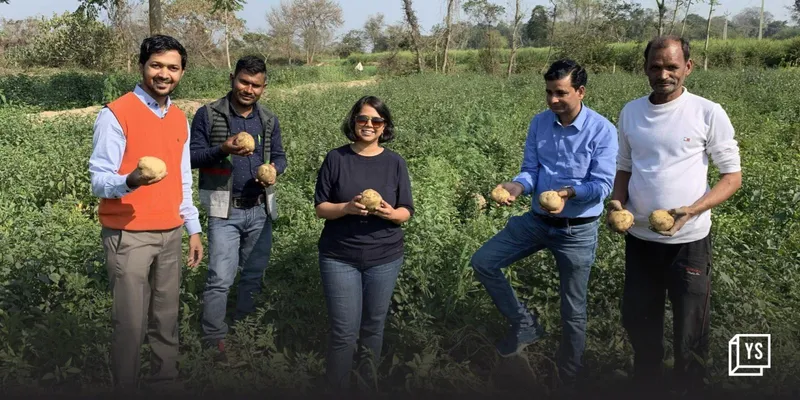Pune agri-biotech startup BioPrime is helping farmers grow climate-resilient crops
Pune-based agri-biotech startup BioPrime develops bio-molecules that ensure optimum plant growth and performance, ensuring crops that are capable of withstanding adverse climatic conditions.
In 2016, over 4,000 farmers of Narayangaon in Maharashtra, Asia’s largest tomato hub, lost 100 percent of their yield. Temperature fluctuations, which coincided with the flowering season, resulted in low yield.
This incident didn’t sit well with Renuka Diwan. A PhD in plant biology, Renuka was attending a function in Pune when she heard about the issue. Ironically, while over 4,000 farmers had lost their entire yield, people had spent Rs 10,000 for meals at the function.
Wanting to do something about the problem, Renuka, along with fellow PhD scholars Shekhar Bhosale and Amit Shinde, started in 2016.
The Pune-based agri-biotech startup develops bio-molecules that ensure optimum plant growth and performance, and are capable of withstanding adverse climates.
“We were taken aback by the vast disconnect that exists between scientific progression and technological advancement, and its translation into commercially available resources for farmers,” Renuka tells YourStory.
The founders recognised the need to ensure optimal functioning of plant processes that can withstand unfavourable weather, and this is how their journey began.
At present, BioPrime products are used by farmers in states like Maharashtra, Rajasthan, and Andhra Pradesh.
What BioPrime offers
BioPrime has eight products in the market. These products fall into three categories: stress mitigation, growth enhancement, and yield enhancement.
Renuka explains, “We use small biomolecules, either from plants or microbes, that targetedly activate certain processes in plants. These, in turn, are able to modify how these processes and the plant functions.”
For a single application, a farmer usually spends between Rs 300 and Rs 500 on the product. A farmer can also buy all the products from BioPrime, which would cost them five to 10 percent of the total input cost. This varies according to the crop.
For vegetables, it costs somewhere between Rs 2,000 to Rs 2,500; for grapes and sugarcane, it costs around Rs 5,000 to Rs 6,000.
“But we calculate return on investment even for farmers like cost benefit ratio. So, for vegetables, for every one rupee that they spend on us, they earn about Rs 7 to Rs 8 extra. In case of high value vegetables like brinjal, they earn Rs 17 extra; for flowers like chrysanthemum and marigold, they earn Rs 19 for every rupee they spend. Similarly, for cotton and sugarcane, they earn Rs 20 for every rupee they spend on us,” Renuka says.
Depending on the crop and its market value, the cost benefit ratio changes. Broadly, on every rupee a farmer spends, they earn back, on an average, Rs 8 to Rs 12.
The building blocks
Renuka, Shekhar, and Amit have done their PhD in Plant Sciences from the University of Pune, Maharashtra, and come with significant expertise in their field.

BioPrime Team
Renuka states, “Our team has people from plant sciences, applied sciences, agriculture, agronomy, biotechnology, microbiology, clinical microbiology, and so on.”
At present, the startup has a 38-member strong team divided into research and development, business development, sales and marketing, and production.
Hurdles along the way
Figuring out how to take the product to the farmers was not an easy task for the startup.
“We discovered that having the molecules was not enough. We also needed to figure out how the farmer was going to use the product at the right time. This also meant designing the applications, deciding the dosages, timelines, etc,” the founder says.
Gaining farmers' trust for the product and the brand was yet another hurdle the team had to cross. The founders knew their solutions had to be adopted by small and regional farmers. This also meant working on sensitisation and building awareness.
Renuka considers the task of getting B2B partners as an ongoing challenge. “Much like how convincing a farmer can be a challenge, the same thing applies in terms of B2B channels as well,” she says.
She adds that a significant amount of innovation and agri inputs are imported, and only a few are Indian innovation. Therefore, the trust factor around this is very low.
Partnerships with The Nudge Foundation and Cisco have significantly helped Renuka and her team to get past these hurdles. “They connected us with a couple of good foundations, startups, and peers in the ecosystem," she says.
Growth and the competition
BioPrime has raised over $2 million through grants and investments. “We have recently closed our pre-Series A investment from Omnivore,” Renuka says.
According to filings with the Registrar of Companies, BioPrime made a revenue of approximately Rs 89 lakh in the fiscal year 2021.
“In BioPrime, we have a great example of an innovation designed to improve both human and planetary health. We hope to see more entrepreneurs like the BioPrime team step up to the challenge and help change the course of Indian agriculture for the better,” said Mark Kahn, Managing Partner at Omnivore, at the time of investment.
At present, the startup has competitors in the likes of Biostadt, UPL, PI, IFFCO, Verdesian.
But BioPrime maintains that its products are formulated more efficiently, have better shelf life and stability, promote direct growth, and have 100% batch-to-batch consistency.
“In comparison to commercially available products, our product ensures 3X more effectiveness and is also compatible with agrochemicals, nutrients, and fertilisers,” Renuka says.
BioPrime is working with corporates like DCM Shriram and Agrostar for co-development of products as well as with corporates like Delta Agrostar, BigHaat, Bharat Agri, and organisations like TATA Trust-Social Alpha and Deshpande Foundation for product distribution.
It is piloting with some leading agri-input companies in India as well.
Roadmap for the future
The BioPrime team aspires to work in the category of plant protection, which would involve the development of safer insecticides, pesticides, weedicide, herbicides, etc.
To accelerate product development and market reach, the team is also working on two new platforms called Sniper and Bio Nexus for biomolecule discovery and plant-associated microbe discovery, respectively.
With the Bio Nexus project, the team is building India's largest plant-associated microbe library for crop trait modification.
“While Snipr is already commercialised, the Bio Nexus products are in the development stage and will be commercialised soon,” Renuka says.
(The copy was updated to correct a typo)
Edited by Megha Reddy










